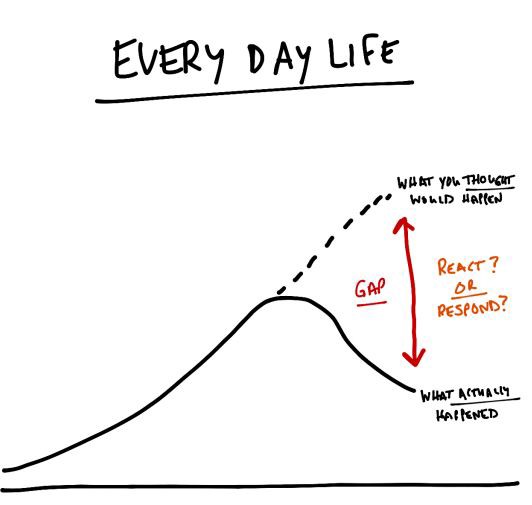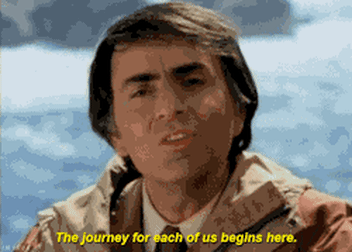
We all face times when our reality does not meet expectations. This becomes painful when we’re unable to manage the gap between the two. The wider the gap, the more we suffer, especially if we resist and deny. When we build awareness and take responsibility for the filters through which we see the world, we put ourselves in the driver’s seat and can manage how events impact us. Learn eight things you can do when your reality doesn’t meet your expectations. (Estimated reading time: 7-8 minutes)
“Just let go. Let go of how you thought your life should be, and embrace the life that is trying to work its way into your consciousness.”
— Caroline Myss
One of the first lessons we learn as children is that reality won’t always meet our expectations.
Many of us learned this the hard way: when the cool kids in school rejected us or when we received a different Christmas gift from the one we wanted.
This truth about reality is reinforced as we grow up. We didn’t get the job we wanted. We miss out on the chance to date the person of our dreams. An injury slows down our fitness progress, and so on.
The First Truth of the Buddhist Doctrine, The Four Noble Truths, states that human life is one of suffering or “dukkha,” which is a Sanskrit word that roughly means “stress” or “dissatisfaction.”
While this may sound negative, the truth is that accepting the inevitability of pain and potential misfortunes can actually free us from expecting a perfect existence. It allows us to prepare for the inevitable storms that will encroach on our lives.
One of the biggest causes of suffering is not managing the gap between our expectations and reality. The wider the gap, the more we suffer, especially if we resist reality and desperately want things to be different.
The way to cope with reality, according to Buddhist teachings, is through “meditation, good behavior, and spiritual and physical labor.” So, while the events in our lives can feel out of our control, we have the power to cope with them by managing our internal worlds.
Perspective is everything: understanding the mental models that create our reality

Thinking about the future is a form of mental time travel at which humans are uniquely gifted.
Our future-mindedness is an essential ingredient for growth as a species. Without it, we can’t imagine all the potential new paths we can pursue without physically attempting them.
Goal-setting is a structured approach that gives form to our expectations. It offers more focus and specificity to the things we would like to manifest in our world. However, the usefulness of goal setting depends on how we anticipate events that will unfold.
Some studies show that the more people fantasize about reaching their goals, the less effort they put into realizing them. They enjoy the desired future in the present moment without investing in making them real.
We must watch out for this tendency when we engage in Law of Attraction practices like visualization that recommend we deliberately imagine our ideal reality to draw to us the people and events that we need to make it happen.
These practices can be turned into goal-directed behaviors if we use them to look at the hurdles that impede us and let them motivate us to overcome them. In his book, “Mind over Mind,” journalist Chris Berdik reveals that anticipation can shape our perception and actions for the better.
The downside of expecting too much, according to Berdik, is that it can set us up for disappointment. This happens when we believe that we are going to ace a test only for our minds to go blank when taking the test because we built it up so much.
Aiming for the best and visualizing a dream life is not the problem —our attachment to expectations is. Attachment, according to Buddhist teachings, is the root of suffering.
These activities are meant to empower us to choose wisely and take action. The purpose gets defeated when we inflate those expectations and overestimate the probability of them happening. These five factors impact the degree of our attachment to an outcome:
- Perfectionism
- Comparing ourselves to others
- Being influenced by others’ expectations of us
- An unhealthy need for escapism
- Being rigid in our preferences, judgment, and methods
- Grandiosity (an exaggerated sense of self-importance and overestimation of our capabilities)
The first step of getting a grip on these mental traps is awareness and taking responsibility for our interpretations. When we’re willing to take a closer look at the filters through which we see the world, we put ourselves in the driver’s seat and can manage how events impact us.
Having faith in the unknown: an antidote when reality does not meet your expectations

Our reality is significantly affected by our belief systems and the stories that we tell ourselves based on them. Our beliefs originate from the experiences we’ve had—especially our childhoods.
One of the most crucial beliefs is metaphysical: do we believe that the Universe is friendly, benevolent, and works in our best interest?
Albert Einstein said that it’s the most important decision we make because it influences how we respond to things in our lives and how it makes us feel.
Recall a time in your life when you faced disappointment because something you really wanted didn’t pan out the way you hoped. Did you feel like a victim of your circumstances, or did you trust that there’s a higher purpose for why things happened the way they did?
People who feel like victims insist that every occurrence is random and that we’re mere mortals being tossed around by cosmic tidal waves. This narrow perspective of their ego prevents them from seeing the purpose behind challenges.
The other group believes that everything that happens to them is for the highest good of themselves and others. They trust that there’s a benevolent force that orchestrates the events in their lives. The world is one big school in which every experience makes them wiser.

In the end, there’s no legitimate proof of the validity of either viewpoint—it comes down to which one you choose to believe in. It’s a matter of personal choice and picking the one that benefits you the most.
Believing in a conscious universe makes it easier to deal with a reality we don’t like. We’re also open to picking up crucial life lessons and invaluable clues that could lead us to higher ground.
It also humbles us. We move from a me-centered to an other-centered perspective. In other words, we stop thinking that we are the center of the Universe. When reality does not meet our expectations, it might be due to multiple reasons that may have nothing to do with us.
For example, you would feel a lot better if you knew that the job you really wanted was given to a candidate who needs it more than you, like a single mother struggling to care for her child and pay her rent. While you have savings for a few months, she is overdue on all her bills.
There’s an element of mystery behind every event—faith helps us believe that it’s for the best even if it doesn’t go according to plan. This approach will lead us to a happier place if we listen and learn.
Here are eight things you can do when your reality doesn’t meet your expectations:
Do the inner work:
- Examine your expectations: Look at your expectations and honestly ask yourself how likely it is to happen. Is it based on wishful thinking and denying the truth of how things are? Having high expectations can be a good thing if it motivates you to act and you have the resilience to deal with the obstacles on the way. Just know the odds that you’re up against and stay flexible.
- Become aware of your triggers: There is often one specific event or person that can cause us to go into a downward spiral and question our progress. To prevent a triggered state from coloring our whole perspective, become aware of what they are, where they come from, and find ways to manage them when they come up.
- Question the stories you tell yourself: As natural storytellers, we create narratives about the events in our lives. These stories repeat in our heads every day whether we’re aware of them or not. Is the story you tell yourself about your life empowering, or is it disheartening? No matter what you’ve gone through, you can re-write a story that can help you see the possibilities for growth.
Take action:
- Deal with reality: As the saying goes, “the truth will set you free.” Denial only slows down progress and can even make the situation worse. Take a hard look at what doesn’t seem to be working and accept it for what it is. When we release our resistance to “what is,” we can use that energy to move forward.
- Focus on winning small victories: Initially, it might seem like you’re far away from what you want to achieve. To build confidence, break down your end goal into smaller ones that are easier to accomplish. This builds trust and momentum in the process.
Practice self-care
- Acknowledge how far you’ve come: Most of us tend to judge ourselves harshly and fixate on what isn’t working. If you find this happening, pause, appreciate how far you’ve come, and be grateful for all the milestones you’ve reached. This encourages you to keep going and boosts your confidence in your abilities.
- Find happiness in the here and now: Avoid postponing your happiness for a distant reality by doing things that make you happy in the here and now. That means carving enough time in your schedule for activities and self-care practices that offer the emotional experience you desire.
- Practice compassion: Life is full of ups and downs, and it’s okay to feel down when things don’t work out. Honor your feelings and be kind to yourself as you move through the rough patches. You’ll also feel better if you forgive others for their oversights.
Given the unpredictability of life, one of the best approaches is allowing whatever comes in and rolling with it. No matter what happens, see the wonder in what unfolds. When we do this, life becomes an exciting ride of discovery that can take us to interesting places both in our internal and external worlds.
All my best on your journey,
Seline

Question for you: What do you do when you reality does not meet your expectations? How does it make you feel, and what can you do to change it?
Did you like this post? Sign up below, and I’ll send you more awesome posts like this every week.

Very nice.
Accept what we can’t change
and change what we can.
Thank you.
It’s a wise saying, but it is so hard to do at times! We know what we need to do and sometimes even how to do it, but actually doing it and making it stick, that seems to be the hardest part a lot of the times. At least I know it is that way for me. Accepting things is hard, even when we know we should and that there isnt much else we could do about a situaiton!
You’re welcome John!
It’s a lot more difficult than that though. At least that has been my experience. We can say things simply and easily but doing them and actually making them stick is often a lot harder. And that is not always because of a fault or failure on our part. That is just how life is at times, isn’t it?
This all outlines an interesting perspective, one that I have not really given much thought to to be honest. It gives me something to ponder over. I appreciate the new perspective and outlook- thanks for sharing with us and for this informative blog. Always love reading and thinking about these!